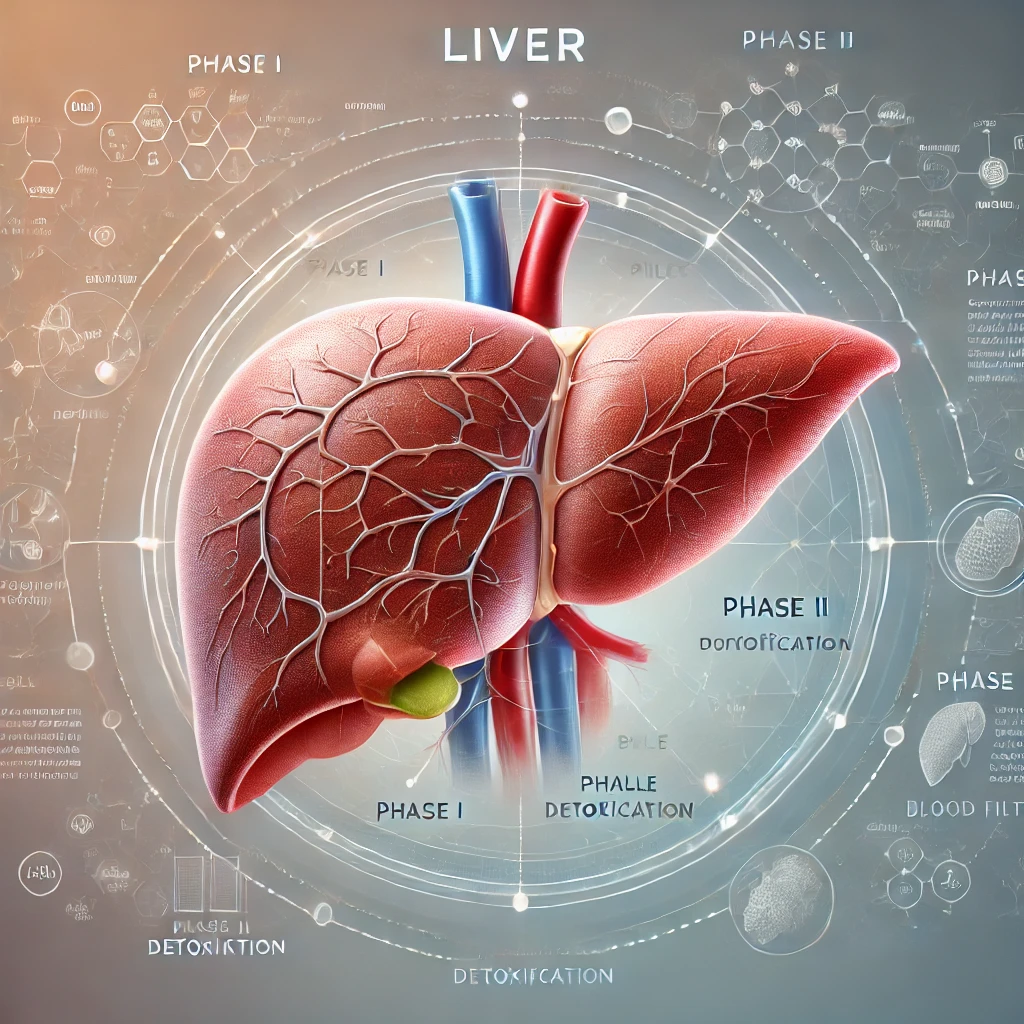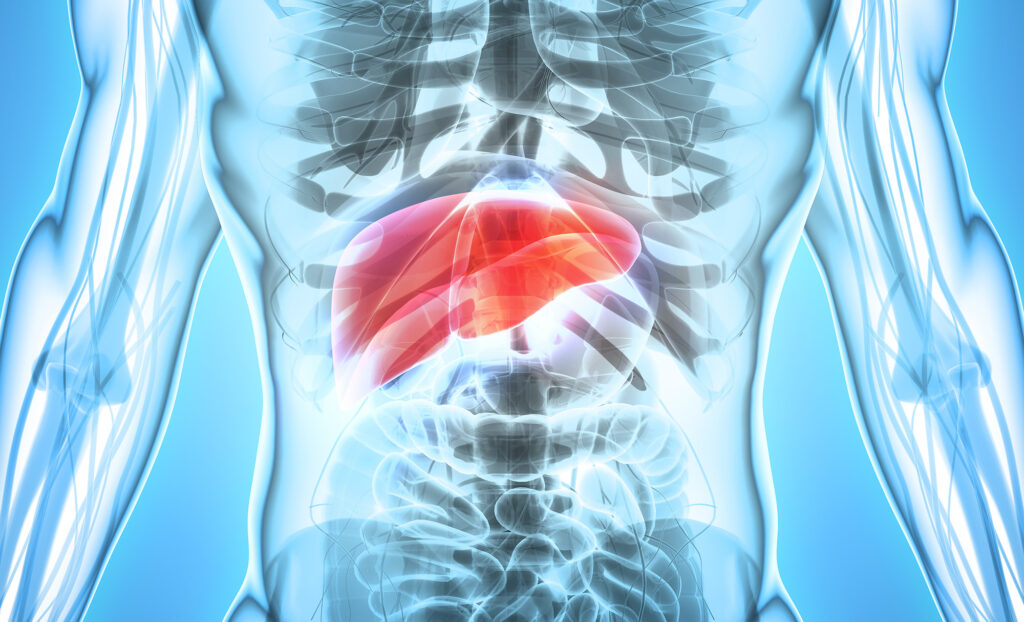Table of Contents
Understanding the Liver’s Multifaceted Role
The liver is a vital organ with diverse functions critical to health. It detoxifies harmful substances, metabolizes nutrients for energy, and produces bile for fat absorption. It synthesizes essential proteins, stores vitamins and minerals, regulates blood sugar, and supports immunity. However, metabolic imbalances can lead to fat accumulation in the liver, increasing the risk of fatty liver disease. Maintaining liver health is essential for overall well-being and balance.
Understanding the liver’s detoxification pathways enhances our appreciation of its critical role in maintaining wellness. Detoxification occurs in two main phases: Phase I, where toxins are activated and transformed into intermediate compounds, and Phase II, where these compounds are neutralized and prepared for elimination. This sophisticated process enables the body to manage potentially harmful substances encountered through diet, environment, and metabolic byproducts. By breaking down fat-soluble toxins into water-soluble forms, the liver ensures efficient excretion through bile or urine. Exploring this process reveals the liver’s extraordinary capacity to protect the body, underscoring the importance of adopting lifestyle choices that support its function.
The Liver’s Functions and Importance
- Introduction to the liver’s location and its various functions in the body.
- Highlighting the liver’s significance in metabolism, digestion, nutrient storage, bile production, and blood sugar regulation.
- Emphasizing the liver’s ability to prioritize detoxification as a critical function for overall well-being.
Phase I Detoxification: Activation and Transformation
- Explaining Phase I detoxification as the initial step in the liver’s detoxification process.
- Introducing cytochrome P450 enzymes and their role in activating and transforming toxins.
- Describing the conversion of fat-soluble toxins into reactive intermediates.
- Providing examples of chemical reactions, such as hydroxylation, dealkylation, and deamination, that occur during Phase I detoxification.
Phase II Detoxification: Conjugation and Neutralization
- Explaining Phase II detoxification as the process that follows Phase I and focuses on conjugation and neutralization of toxins.
- Describing various conjugation pathways, including glutathione conjugation, sulfation, glucuronidation, acetylation, methylation, and amino acid conjugation.
- Detailing the role of enzymes, such as glutathione S-transferase (GST), sulfotransferases, UDP-glucuronosyltransferases (UGTs), and others, in facilitating conjugation reactions.
- Highlighting the importance of these reactions in neutralizing toxins and making them water-soluble for easier elimination.

The Balance Between Detoxification and Synthesis
- Explaining the liver’s versatility in producing over 13,000 known products while prioritizing detoxification.
- Emphasizing the liver’s ability to balance detoxification with its synthetic functions.
- Describing the regulation of detoxification enzymes and pathways to maintain this delicate balance.
- Discussing how genetic factors, environmental exposures, medications, and diet can influence the liver’s detoxification capacity.
Supporting Liver Health for Optimal Detoxification
- Providing practical tips and lifestyle modifications for promoting liver health.
- Emphasizing the importance of a balanced diet, regular exercise, hydration, and limited alcohol consumption.
- Highlighting the significance of avoiding exposure to environmental toxins and managing stress levels.
- Exploring the role of maintaining a healthy body weight in supporting liver function.
The Liver’s Extraordinary Journey of Detoxification
- Recapitulating the liver’s crucial role in detoxifying harmful substances to protect overall health.
- Summarizing the simple explanation of Phase I and Phase II detoxification pathways.
- Reinforcing the importance of understanding the liver’s detoxification process for making informed choices that support liver health.
- Encouraging readers to adopt a holistic approach to maintaining liver well-being through lifestyle modifications and a balanced diet.
Conclusion: A Lifeline of Health
The liver’s intricate detoxification pathways are a testament to its indispensable role in maintaining overall well-being. By expertly balancing the removal of toxins through Phase I and Phase II detoxification and synthesizing essential compounds, it ensures the body operates at its peak. This dynamic organ, capable of both protection and production, highlights the importance of lifestyle choices in supporting its function. A balanced diet, regular exercise, hydration, and mindfulness about toxin exposure can fortify liver health. By understanding its processes and prioritizing habits that sustain its vitality, we can safeguard this vital organ. Appreciating the liver’s remarkable capabilities inspires a proactive approach to health, ensuring it thrives as the body’s cornerstone of detoxification and balance.
How useful was this post?
Click on a star to rate it!
Average rating / 5. Vote count:
No votes so far! Be the first to rate this post.
Author
-
Meet Dr. Kendall Gregory, a highly accomplished professional with a remarkable academic background and a deep passion for empowering individuals through knowledge. Dr. Gregory’s educational journey began with a Bachelor of Science degree, followed by a Doctor of Chiropractic Medicine, focusing on diagnosing and treating musculoskeletal conditions. He further expanded his expertise with a Master's degree in Oriental Medicine, specializing in acupuncture and Chinese herbology, and a Master's degree in Health Care Administration, emphasizing his dedication to improving healthcare systems. Dr. Gregory combines his extensive knowledge and practical experience to provide comprehensive and integrative healthcare solutions. Through his writings, he aims to inspire individuals to take charge of their health and make informed decisions.
View all posts







